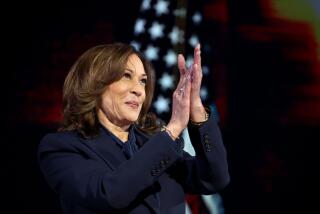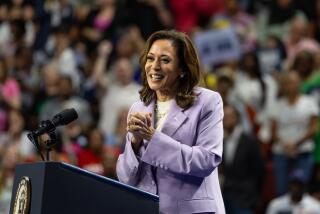U.S. Outsider Surprises Congo
- Share via
KINSHASA, Congo — It’s not easy to stand out when you’re running against 32 other candidates.
But Oscar Kashala, a Massachusetts doctor with dreams of being the Democratic Republic of Congo’s next president, got some help from an unlikely source: current President Joseph Kabila.
In May, Kabila accused Kashala’s private security guards of plotting a coup. But most viewed the allegations as a desperate attack against a challenger who appeared to be gaining in popularity. Rather than tarnish Kashala, it seemed to cement his reputation as an outsider.
“It helped a lot, really,” said Kashala, 51, whose slick, Western-style political campaign has been heavily backed by donors and consultants from the U.S.
As Congolese officials continued tallying millions of ballots Monday from the Central African nation’s historic election Sunday, Kashala remained a long shot to win.
But even if he places third or fourth, as some early returns show, he and his newly formed party, the Union for the Reconstruction of Congo, stand to win a seat at the political table in charting Congo’s future.
“Even third place is a major power for a party that has just started,” Kashala said. “Those other guys have been doing this for years.”
The early returns appear to be favoring Kabila and businessman-turned-rebel Jean-Pierre Bemba, who is currently a vice president. According to figures from the Bemba campaign, Kabila and Bemba both appear to have earned more than 40% of the vote, meaning they will probably face each other in a runoff in October.
“Things are going very well for us,” Bemba said Monday night from his Kinshasa headquarters, his cellphones buzzing with the latest electoral updates.
Officials with Kabila’s campaign declined to comment.
One of the biggest election surprises, however, could prove to be the performance of Kashala, who appears to be winning about 10% of the vote, according to early estimates from Bemba’s campaign. Observers call it an impressive showing for a political novice who has lived in the U.S. for the last 20 years and only returned to Congo this year to launch a full-time campaign.
“He came out of nowhere and ran a very good campaign,” said Yves Kisonbe, Bemba’s legal advisor.
Frustrated by government corruption and ongoing violence, many voters said they were attracted by Kashala’s “white hands.”
After casting his ballot Sunday, public-works employee Tshimanga Tsilabeni of Ntampa said: “I like that he’s never been involved in the government before. That’s the kind of person we need now.”
The Harvard-trained cancer researcher also faces plenty of skepticism. Critics accuse him being a carpetbagger.
“He abandoned his country and hasn’t lived here for many years,” said taxi driver Justin Mbaya. “When you don’t live in someone’s house, you can’t really understand their problems.”
But Kashala, who is married with eight children (three of them adopted), instead highlights his roots, noting he was born in Congo’s Katanga province, also the home province of Kabila. His father worked on the national railroad. As a student activist at the University of Kinshasa, Kashala fought against former dictator Mobutu Sese Seko.
“I’m a son of Congo,” he said.
Even while attending Harvard and later working for pharmaceutical research companies in Massachusetts, Kashala said, he remained active in Congo’s development. He consulted with the World Health Organization and led humanitarian projects to develop health clinics and try to reduce HIV infections in his native country, formerly known as Zaire.
After completing work at Harvard in 1992, he said, he intended to return home to open a national cancer research center. But plans fell through amid the country’s ongoing chaos, and he stayed in the U.S. and worked with private biotech firms.
The idea to run for president came in 2004 during a humanitarian trip through one of Congo’s national parks. His delegation ran across of small group of children, half-naked and malnourished, complaining about their families’ inability to plant crops because of militia attacks. Kashala reported the problem to government officials, who seemed uninterested.
“I realized that the major problem in this country is a lack of compassion for the poor,” he said. “There is just no vision or plan to develop the nation.”
In an election that has inflamed anti-Western sentiment and turned “Congolese-ness” into a major campaign issue, Kashala is somewhat cagey on the issue of his U.S. citizenship. He’s told some journalists he is a naturalized U.S. citizen. Other times he has denied having dual citizenship, which is frowned upon under Congolese law and a likely sore spot with voters.
Asked directly, he said only that he is a “citizen of the world.”
Kashala acknowledged, however, that much of his campaign funding and support has come from outside Congo, particularly the U.S.
“We’ve raised a lot of money and spent a lot,” he said.
Kashala is one of the only presidential candidates not serving in the government who has been able to afford nationwide television advertising. His website includes a link to contribute online, though the vast majority of Congolese don’t have access to the Internet.
Campaign advisors include the Dutko Group, a Washington lobbyist and public relations firm whose partners include President Clinton’s former deputy chief of staff, and AQMI Strategy Corp., an Orlando, Fla.-based security consultant.
He declined to say exactly how much his campaign has spent or where the bulk of the money came from.
“The source of his funding is not clear,” said Caty Clement, analyst for the International Crisis Group, a conflict-resolution organization.
Though several of Kashala’s fellow candidates boast their own private militias, he insisted he was not worried about being attacked or facing renewed harassment, such as the treason charges levied in May.
“They won’t touch me,” he said. “I’m a friend with many ambassadors here, and a friend of the U.S. and the European Union. These people tried to break our backs once already and they couldn’t do it. I’m not going anywhere.”
More to Read
Sign up for Essential California
The most important California stories and recommendations in your inbox every morning.
You may occasionally receive promotional content from the Los Angeles Times.













